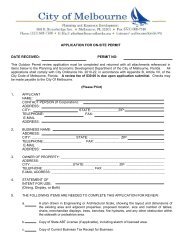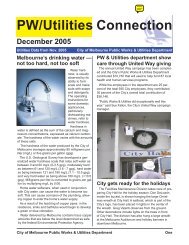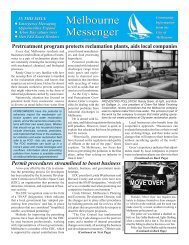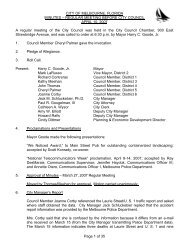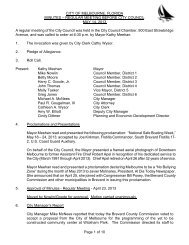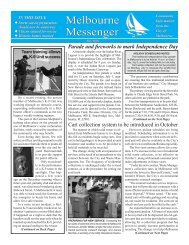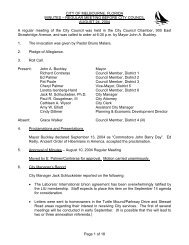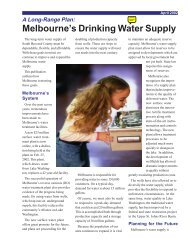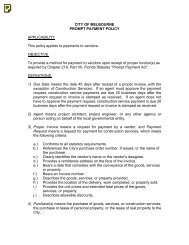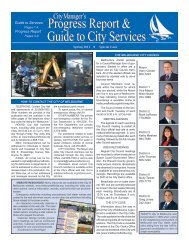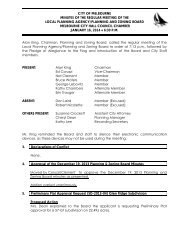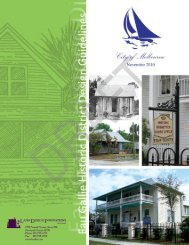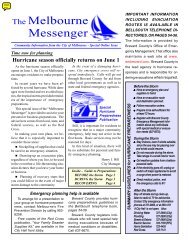March 26 - City of Melbourne, Florida
March 26 - City of Melbourne, Florida
March 26 - City of Melbourne, Florida
You also want an ePaper? Increase the reach of your titles
YUMPU automatically turns print PDFs into web optimized ePapers that Google loves.
CITY OF MELBOURNE, FLORIDA<br />
MINUTES – REGULAR MEETING BEFORE CITY COUNCIL<br />
MARCH <strong>26</strong>, 2013<br />
Ms. Tasker asked if there is a state statute that reads the same as the model ordinance. Ms.<br />
Souto replied that she doesn’t believe so. She added that the cities are being <strong>of</strong>fered an<br />
opportunity to adopt a model ordinance, although she doesn’t believe there are any<br />
restrictions with cities going beyond the model.<br />
Attorney Gougelman advised that once you meet the test <strong>of</strong> being located in a watershed<br />
that is impaired by nutrients as referenced in state law, then the state statutes require you to<br />
adopt at a minimum FDEP’s model ordinance. If the <strong>City</strong> wants to go beyond that, based on<br />
statute language, we have to have a comprehensive program in place to address non-point<br />
sources <strong>of</strong> nutrient pollution. The term “comprehensive program” is not defined. The <strong>City</strong><br />
Engineer is working on a master comprehensive program for the <strong>City</strong>; however, it’s not in<br />
place. Following review, Attorney Gougelman stated that staff reached the conclusion that<br />
the program needs to be something adopted by the local government.<br />
Ms. Tasker asked if the state has directed adoption <strong>of</strong> the model plan within any timeframe.<br />
The <strong>City</strong> Attorney replied no, although the statute has been on the books since 2009.<br />
Ms. Tasker asked Dr. Souto if adoption <strong>of</strong> the model ordinance would benefit the lagoon.<br />
Ms. Souto replied that, cautiously, she would like to think that it would. She added that many<br />
<strong>of</strong> the items in the model are already being done – typical best management practices. She<br />
said that she’s fearful the model ordinance is simply status quo.<br />
Council Member Thomas expressed support for pursuing a water improvement committee<br />
made up <strong>of</strong> members from each city along with interested organizations. Regardless <strong>of</strong> what<br />
happens with this ordinance, the best thing we can do is create a public awareness<br />
campaign focused on behavior and education to improve the water quality <strong>of</strong> the lagoon.<br />
Council Member Jones said that he was also thinking along those lines. If a working group is<br />
created, he recommended that a threshold be established so everyone knows what they are<br />
working towards. He commented that he believes it would take an organization to intervene<br />
and coordinate that effort.<br />
Michael Zeno, 983 Castile Road, Palm Bay, said he works mostly in the <strong>City</strong>. He stated that<br />
he supports the state DEP model ordinance. Mr. Zeno asked if there has been any<br />
discussion about exempting pr<strong>of</strong>essionals who are certified, licensed and registered.<br />
Council Member Goode said that is a good question for the <strong>Florida</strong> Legislature, since it<br />
passed these regulations.<br />
Michael Alford, 1547 White Cap Way, stated that as a homeowner, he should have the right<br />
to do what he feels is best for his yard.<br />
Elliott Zace, 2777 Fitzpatrick Avenue, Palm Bay, said that the proposed ordinance demands<br />
a 50% slow release fertilizer, which is constantly being released. If we’re trying to stop the<br />
release <strong>of</strong> fertilizer from run<strong>of</strong>f or leaching, the way to do that is not by using slow release<br />
Page 11 <strong>of</strong> <strong>26</strong>



